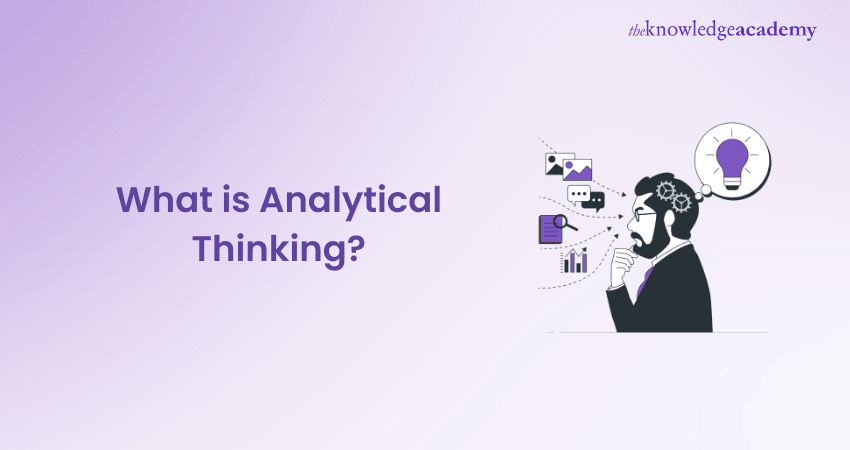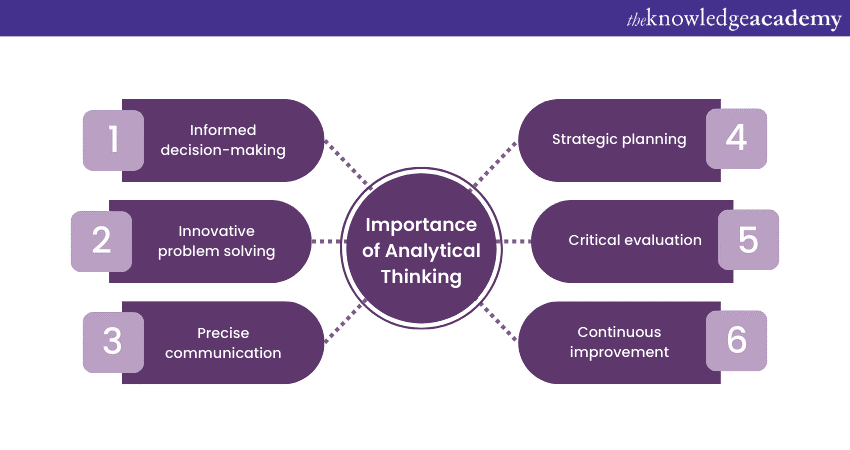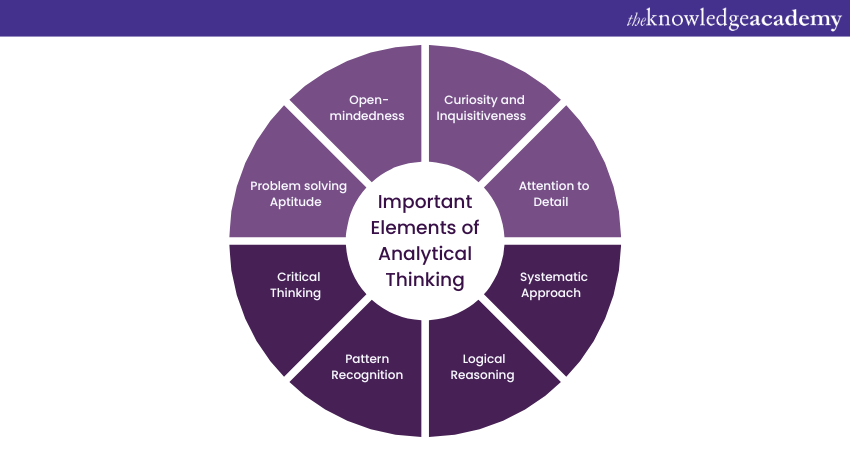We may not have the course you’re looking for. If you enquire or give us a call on +44 1344 203999 and speak to our training experts, we may still be able to help with your training requirements.
We ensure quality, budget-alignment, and timely delivery by our expert instructors.

Are you curious about how to sharpen your problem-solving skills and make more informed decisions? Understanding What is Analytical Thinking can be the key to unlocking these abilities. Analytical Thinking encompasses breaking down complex information into smaller, manageable parts, allowing you to see patterns and draw meaningful conclusions.
This blog will shed light on the core principles of Analytical Thinking and illustrate its importance in both personal and professional contexts. By the end, you'll have a clear understanding of What is Analytical Thinking and how it can be applied to enhance your decision-making process. Dive in and discover the transformative power of Analytical Thinking today!
Table of Contents
1) What is Analytical Thinking?
2) Why is Analytical Thinking Important?
3) Important Elements of Analytical Thinking
4) How to Master Analytical Thinking?
5) Who Can Benefit from Practicing Analytical Thinking?
6) How is Analytical Thinking Different from Creative and Critical Thinking?
7) Good-paying Careers for Analytical Thinkers
8) Conclusion
What is Analytical Thinking?
Analytical Thinking refers to the cognitive process of breaking down complex problems, data sets, or situations into smaller, more manageable parts to uncover patterns, relationships, and fundamental principles. It involves keen observation, logical reasoning, and systematic analysis to derive well-informed conclusions or solutions. This skill permits individuals to make sound decisions, foster innovation, and effectively communicate intricate ideas.
Analytical Thinking is the keystone of effective problem-solving, allowing individuals to tackle challenges with accuracy and adaptability, whether in everyday life, business environments, or academic settings. By honing this skill, one can navigate complexities with confidence, leading to more strategic and insightful outcomes.
Why is Analytical Thinking Important?
After learning about What is Analytical Thinking, let's delve into the multifaceted importance of Analytical Thinking:

1) Informed Decision-making
At its core, Analytical Thinking empowers individuals with the ability to dissect intricate scenarios, extract relevant information, and make well-informed decisions. Whether you're contemplating a career change, evaluating a major investment, or determining the best course of action, Analytical Thinking enables you to weigh the pros and cons, identify potential pitfalls, and forecast outcomes accurately.
2) Innovative Problem Solving
Innovation often emerges from the ability to connect seemingly unrelated ideas and uncover hidden solutions. Analytical thinkers excel at breaking down difficult complex problems into manageable parts and reassembling them in novel ways. This cognitive flexibility fosters innovation, allowing individuals to envision alternative paths and approaches that might otherwise remain hidden.
3) Precise Communication
Clear and effective communication is crucial in all aspects of life. Analytical Thinking enhances the ability to organise thoughts logically, structure arguments coherently, and present ideas with precision. Whether explaining a concept to a colleague, delivering a persuasive pitch, or writing a research paper, an analytical thinker's ability to convey complex ideas succinctly and comprehensibly is invaluable.
4) Strategic Planning
Strategic planning, whether for business strategies or personal goals, relies on the ability to anticipate outcomes, devise contingencies, and adapt to changing circumstances. Analytical Thinking contributes to strategic acumen by enabling individuals to evaluate multiple variables, foresee potential roadblocks, and chart a course that maximises the likelihood of success.
5) Critical Evaluation
In a world saturated with misinformation and biased narratives, the skill of critical evaluation is more crucial than ever. Analytical Thinking empowers individuals to sift through vast amounts of information, identify credible sources, and distinguish fact from fiction. This discerning ability protects against being misled by superficial allure or baseless assertions.
6) Continuous Improvement
Analytical thinkers possess an innate curiosity that drives them towards constant learning and growth. They view challenges not as insurmountable obstacles but as opportunities for improvement. This dedication to self-improvement extends beyond their capabilities; analytical thinkers often seek to refine processes, systems, and products, contributing to advancements in their fields and industries.
Unlock your creative potential and enhance your Analytical Thinking skills with our comprehensive Creative and Analytical Thinking Training!
Important Elements of Analytical Thinking
Now that you know the meaning of Analytical Thinking, let's explore its characteristics. Analytical Thinking is more than a mere mental exercise; it's a unique cognitive approach that involves a specific set of traits and habits. Those with these characteristics are adept at dissecting complexities, drawing insights from data, and arriving at well-reasoned conclusions. Here are the key attributes that define Analytical thinkers:

1) Curiosity and Inquisitiveness
Analytical Thinkers exhibit a natural curiosity about the world around them. They possess an insatiable desire to understand how things work and why they are the way they are. This curiosity fuels their exploration of concepts, data, and problems, leading them to uncover hidden connections and unexpected insights.
2) Attention to Detail
One of the hallmarks of Analytical Thinking is an unwavering attention to detail. Analytical individuals have a knack for spotting even the minutest discrepancies, anomalies, or patterns within data or scenarios that might go unnoticed by others. This acute attention to detail is instrumental in identifying potential issues and crafting precise solutions.
3) Systematic Approach
Analytical Thinkers approach problems methodically. They break down complex issues into manageable parts, which allows them to analyse each component individually before synthesising a comprehensive understanding. This systematic approach enables them to unravel intricate challenges and address them step by logically.
4) Logical Reasoning
This is the bedrock of Analytical Thinking. Those who possess this trait are skilled at constructing and deconstructing arguments, identifying flaws in reasoning, and evaluating the validity of information. This ability helps them sift through the noise and reach well-founded conclusions based on evidence and logic.
5) Pattern Recognition
Analytical Thinkers excel at recognising patterns and trends across various data sets or scenarios. They have an innate ability to identify similarities and differences, allowing them to generalise principles from specific instances and apply them to broader contexts.
6) Critical Thinking
This is a cornerstone of Analytical Thinking. Individuals with this characteristic are not content with accepting information at face value; they question assumptions, challenge norms, and seek underlying reasons. This intellectual rigour ensures that their conclusions are well-substantiated and comprehensive.
7) Problem-solving Aptitude
Analytical Thinkers thrive on solving complex problems. They approach challenges with a blend of creativity and logic, devising innovative solutions that address the root causes rather than merely treating symptoms. Their ability to dissect problems and explore multiple angles empowers them to tackle even the most daunting issues.
Open-mindedness
While Analytical Thinkers possess strong reasoning skills, they also embrace open-mindedness. They acknowledge that not all problems have linear solutions and are willing to explore unconventional ideas and viewpoints. This adaptability allows them to adapt their approach when encountering new and unexpected scenarios.
Learn about the different principles of decision-making with our Decision Making Course – Join today!
How to Master Analytical Thinking?
In order to master your Analytical Thinking skills, you can adapt the following skills:
1) Analysing information involves thoroughly examining data or a situation to identify crucial elements, assess their strengths and weaknesses, and leverage this understanding to construct a compelling argument, offer recommendations, or address a problem effectively.
2) Breaking down problems simplifies significant challenges by dividing them into more minor, manageable issues that are easier to solve individually.
3) Gathering information requires asking pertinent questions of oneself and others to gain valuable insights, facilitating more informed decision-making when tackling problems.
4) Identifying issues and problems involves honing the skill of recognising underlying issues or challenges through analysing trends, associations, and cause-effect relationships within datasets.
5) Identifying the root cause is conducting a thorough analysis to pinpoint the fundamental cause of a problem, ensuring that efforts are focused on addressing the actual issue rather than just its symptoms.
6) Organising information entails systematically arranging and integrating all collected data to derive insights and generate ideas, laying the groundwork for potential solutions to the problems at hand.
Who Can Benefit from Practicing Analytical Thinking?
Practicing analytical thinking is immensely beneficial for professionals in various fields, particularly those requiring strong problem-solving and decision-making abilities.
1) Designers: By applying Analytical Thinking, designers can enhance their creativity and improve problem-solving skills, leading to more innovative and user-centric designs.
2) Software Engineers: Analytical Thinking helps software engineers improve coding efficiency, debug complex issues, and develop more robust and efficient software solutions.
3) CEOs: For CEOs, Analytical Thinking is crucial for making strategic decisions, driving business growth, and navigating complex market environments, ensuring long-term success.
4) Freelancers: Freelancers benefit by managing projects more effectively, making informed decisions, and adapting to various client needs, thereby enhancing their overall productivity and client satisfaction.
How is Analytical Thinking Different from Creative and Critical Thinking?
Analytical Thinking involves solving problems step by step. Analytical thinkers break down information into smaller parts, carefully examining each one until they come to a conclusion. Creative thinking, on the other hand, takes a more flexible approach. Creative thinkers look at problems from different perspectives and are open to new ideas. They focus on coming up with innovative solutions, often thinking outside the box.
Critical thinking combines open-mindedness with strong evaluation skills. Critical thinkers carefully review evidence, ask questions, and consider various viewpoints to come up with a well-reasoned solution.
Good-paying Careers for Analytical Thinkers
Analytical Thinking can lead to well-paying careers. For example, Business Analysts earn around £75,000, helping companies improve efficiency by analysing data and business practices. Cyber Security Analysts, with an average salary of £87,000, protect systems from security threats, while Data Scientists earn about £81,000, using data to drive business decisions across industries.
Financial Analysts, earning around £75,000, guide businesses and individuals on investments and finances. These roles require strong analytical skills, attention to detail, and proficiency in communication and math, making them ideal for methodical thinkers. Analytical Thinking Interview Questions are often used to assess these skills, ensuring candidates can handle complex financial tasks effectively.
Conclusion
Analytical Thinking emerges as an invaluable beacon in a world demanding ever-greater insight and adaptability. Its ability to unravel complexity, innovate solutions, and foster critical evaluation empowers individuals across diverse domains. By cultivating a curious mind, attention to detail and logic, we can get started on a journey of continuous improvement. Hope we could answer all your queries about “What is Analytical Thinking”!
Unlock your leadership potential with our comprehensive Leadership Training - Join now for a transformative learning journey!
Frequently Asked Questions
Can Analytical Thinking be Learned and Cultivated, or is it an Innate Ability?

Analytical Thinking can be learned and cultivated through practice, education, and experience. While some individuals may have a natural aptitude, skills can be developed by engaging in activities that promote critical thinking and problem-solving.
What are the Future Trends and Advancements in Analytical Thinking Research and Application?

Future trends in analytical thinking research include:
a) Integration of Artificial Intelligence (AI) and Machine Learning (ML)
b) Enhanced Data Analytics techniques
c) Development of new educational tools to improve critical thinking skills across various disciplines and industries
What are the Other Resources and Offers Provided by The Knowledge Academy?

The Knowledge Academy takes global learning to new heights, offering over 3,000 online courses across 490+ locations in 190+ countries. This expansive reach ensures accessibility and convenience for learners worldwide.
Alongside our diverse Online Course Catalogue, encompassing 19 major categories, we go the extra mile by providing a plethora of free educational Online Resources like News updates, Blogs, videos, webinars, and interview questions. Tailoring learning experiences further, professionals can maximise value with customisable Course Bundles of TKA.
What is Knowledge Pass, and how Does it Work?

The Knowledge Academy’s Knowledge Pass, a prepaid voucher, adds another layer of flexibility, allowing course bookings over a 12-month period. Join us on a journey where education knows no bounds.
What are the Related Courses and Blogs provided by The Knowledge Academy?

The Knowledge Academy offers various Leadership Courses, including Leadership Skills, Creative Leader Thinking and Creative and Analytical Thinking. These courses cater to different skill levels, providing comprehensive insights into Leadership Qualities
Our Business Skills Blogs covers a range of topics related to leadership and Analytical thinking, offering valuable resources, best practices, and industry insights. Whether you are a beginner or looking to advance your Leadership skills, The Knowledge Academy's diverse courses and informative blogs have you covered.
Upcoming Business Skills Resources Batches & Dates
Date
 Successful People Management and Team Leadership
Successful People Management and Team Leadership
Fri 16th May 2025
Fri 25th Jul 2025
Fri 29th Aug 2025
Fri 10th Oct 2025
Fri 28th Nov 2025






 Top Rated Course
Top Rated Course



 If you wish to make any changes to your course, please
If you wish to make any changes to your course, please


